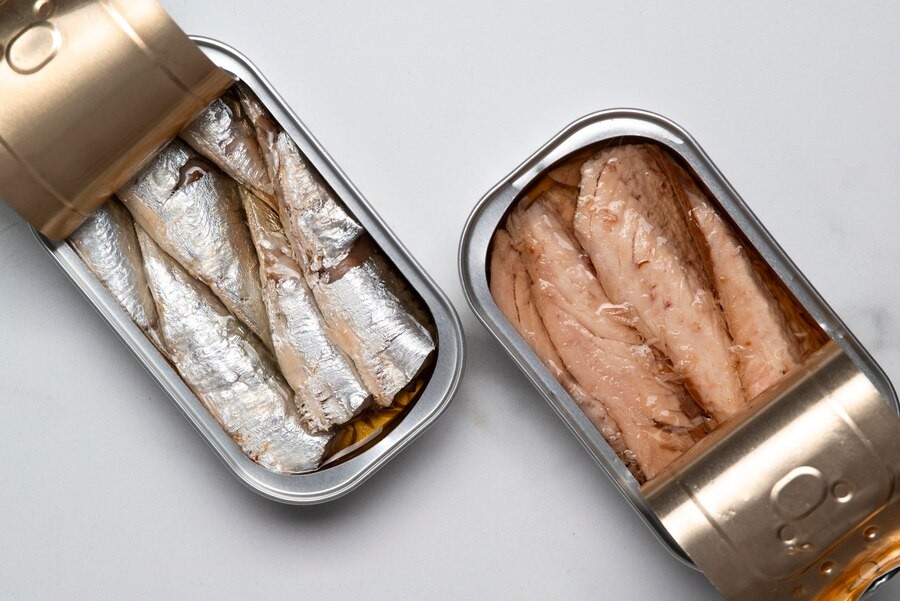Canned fish offers a convenient way to enjoy the nutritional goodness of fish, especially for those seeking an easy-to-prepare meal option.
This type of fish is pre-cooked and ready to eat, requiring minimal preparation. Moreover, canned fish is shelf-stable, allowing it to be stored at room temperature for extended periods without spoiling, making it an excellent option for long-term food supplies.
However, like other processed foods, canned fish comes with its own set of risks. Let’s delve into the benefits and drawbacks of consuming canned fish.
Benefits of Eating Canned Fish
Canned fish serves as a high-quality protein source with minimal processing. Here are some key advantages of including canned fish in your diet:
Source of High-Quality Protein
Varieties like tuna and sardines are packed with protein, which is essential for repairing body tissues, strengthening muscles, and maintaining healthy skin and hair. Despite undergoing the canning process, the protein content in canned fish remains largely intact, making it a practical and reliable option to meet your daily protein needs.
Rich in Omega-3 Fatty Acids
Canned fatty fish such as salmon and sardines are excellent sources of omega-3 fatty acids, which are crucial for heart, brain, and nervous system health. Omega-3s can lower the risk of heart disease, help regulate blood pressure, and support cognitive function.
Packed with Vital Vitamins and Minerals
Convenience and Longevity
One of the biggest advantages of canned fish is its extended shelf life. This makes it an economical and practical choice for individuals and families alike.
Properly stored canned fish also serves as an excellent emergency food option for unforeseen situations.
Risks of Eating Canned Fish
Despite its practicality and affordability, consuming canned fish may pose certain health risks. Here are some potential concerns:
High Salt and Preservative Levels
Many canned fish products contain high amounts of salt and preservatives to extend their shelf life and maintain quality.
Excessive salt intake can lead to health issues such as high blood pressure, heart disease, and kidney problems. To mitigate these risks, it’s essential to choose canned fish products that are low in salt and preservatives and to read product labels carefully.
Heavy Metal Contamination
Certain canned fish varieties might contain heavy metals, such as mercury, which can be harmful when consumed in excess. Mercury exposure poses significant risks to the nervous system, particularly for pregnant and breastfeeding women as well as children.
Opting for fish with lower mercury levels, such as sardines or salmon, and limiting overall consumption can help reduce this risk.
BPA in Canned Packaging
The linings of most canned products, including canned fish, often contain Bisphenol A (BPA). BPA can leach into food and has been linked to hormonal disruptions and potential health concerns like diabetes and cardiovascular issues.
Potential Allergic Reactions
Some individuals may experience allergic or sensitivity reactions due to additives used in the canning process. For those with known allergies or sensitivities, it’s crucial to carefully review ingredient labels to ensure the product is free of potential allergens.
When consumed wisely, canned fish can be a nutritious and practical addition to your diet. To maximize its benefits and minimize risks, prioritize high-quality products, read labels attentively, and enjoy canned fish in moderation as part of a balanced diet.
If you have questions about canned fish or any health concerns, consider using the health consultation feature on the Ai Care app, available for download on the App Store or Play Store.
Looking for information about nutrition, food and other diet tips? Click here!
- dr Hanifa Rahma
Kayla McDonnell (2019). Canned Food: Good or Bad?. Available from: https://www.healthline.com/nutrition/canned-food-good-or-bad
Cancer Council. Can canned food such as tuna and sardines cause cancer?. Available from: https://www.cancer.org.au/iheard/can-canned-food-such-as-tuna-and-sardines-cause-cancer
Nazneen Memon, BHMS, PGDCR. Is Canned Food Good or Bad?. Available from: https://www.medicinenet.com/is_canned_food_good_or_bad/article.htm
Kelli McGrane, MS, RD (20200. Is Canned Tuna Good for You, or Bad?. Available from: https://www.healthline.com/nutrition/is-canned-tuna-healthy
DEFA (2024). Sodium in Canned Foods. Available from: https://www.diabetesdefa.org/index.php/assets/document/sodium-canned-foods
Stephanie Brown (2023). Canned Tuna May Contain 'Dangerous Spikes' of Mercury, New Report Finds. Available from: https://www.verywellhealth.com/mercury-in-tuna-7109556












